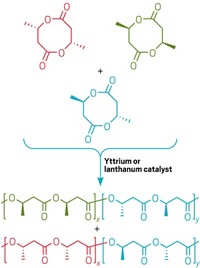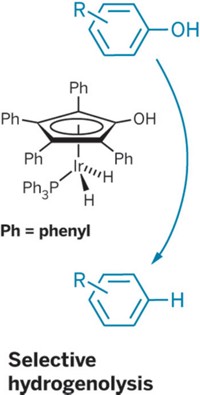Advertisement
Grab your lab coat. Let's get started
Welcome!
Welcome!
Create an account below to get 6 C&EN articles per month, receive newsletters and more - all free.
It seems this is your first time logging in online. Please enter the following information to continue.
As an ACS member you automatically get access to this site. All we need is few more details to create your reading experience.
Not you? Sign in with a different account.
Not you? Sign in with a different account.
ERROR 1
ERROR 1
ERROR 2
ERROR 2
ERROR 2
ERROR 2
ERROR 2
Password and Confirm password must match.
If you have an ACS member number, please enter it here so we can link this account to your membership. (optional)
ERROR 2
ACS values your privacy. By submitting your information, you are gaining access to C&EN and subscribing to our weekly newsletter. We use the information you provide to make your reading experience better, and we will never sell your data to third party members.
Synthesis
Vegetable Oils Yield Polymer Precursors
Low-cost diesters and diols could one day replace petroleum-derived monomers for making high-volume polymers
by Stephen K. Ritter
January 16, 2012
| A version of this story appeared in
Volume 90, Issue 3
A reaction sequence for converting raw olive, rapeseed, and sunflower oils into polymer precursors could one day provide inexpensive replacement feedstocks for petroleum-derived monomers used to make high-volume polymers, an international research team reports (Green Chem., DOI: 10.1039/c1gc16094j). Led by Stefan Mecking of the University of Konstanz, in Germany, and David J. Cole-Hamilton of the University of St. Andrews, in Scotland, the researchers combined the oil, a palladium phosphine catalyst, carbon monoxide, methanol, and methanesulfonic acid in a high-pressure reactor. The oil’s triglycerides first break apart to form unsaturated methyl esters, and then the ester double bond isomerizes to the end of the fatty acid chain, where it’s trapped by a methoxycarbonylation step to form a terminal diester—dimethyl 1,19-nonadecanedioate, CH3OC(O)(CH2)17C(O)OCH3. The team showed that this diester can be hydrogenated using a ruthenium phosphine catalyst to form a diol or hydrolyzed to form a diacid. The diester, diol, and diacid can all serve as polymer precursors, the researchers note. For example, a polyester made from the diester and diol has properties similar to those of polyethylene, Cole-Hamilton says. “We now have a simple catalytic route to a possibly biodegradable polyethylene replacement from renewable resources,” he adds, at a cost of just a few dollars per kilogram for the polymer precursors.





Join the conversation
Contact the reporter
Submit a Letter to the Editor for publication
Engage with us on Twitter